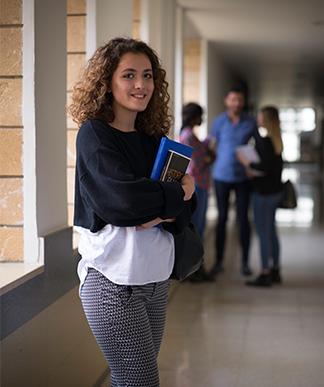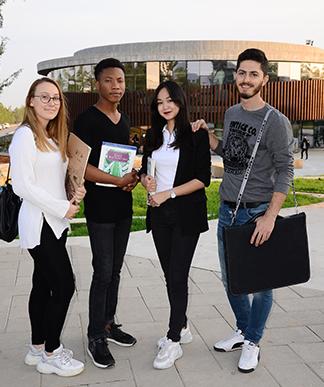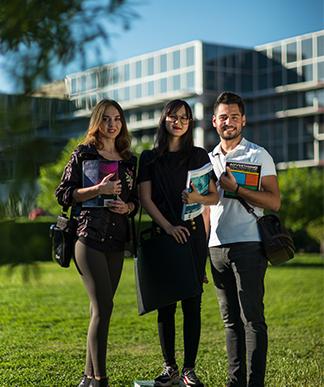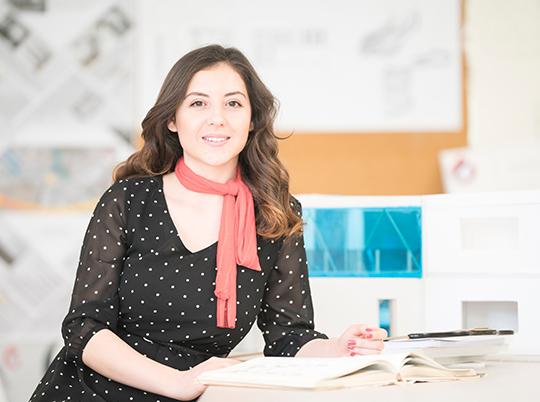


About the Program
The Master in Architecture (M.Arch.) program provides students with a wide perspective by encouraging them to specialize in various areas of architecture. Students gain the required experience of understanding details by evaluating it systematically through the means of different research methods and techniques. Through a number of core and elective courses, students develop their written and spoken skills, sensitivity and understanding by discussing architectural focus within a well-disciplined approach. The program trains students to become self-confident and independent-minded so that they can pursue a successful professional life.
The medium of instruction for the the Master in Architecture (M.Arch.) program is English and a thesis must be submitted for the successful completion of the program. Graduate Studio I and Graduate Studio II are the core courses with other courses being elective. Students must take seven courses, seminar and prepare a thesis.
Education Opportunities
Department of Architecture, within the Institute of Graduate Studies and Research, has different qualities regarding the relationship of educational context and scientific fields, the criteria for student acceptance and the institutional framework of the profession. Master in Architecture (M.Arch.) program, considering the multidisciplinary structure of architecture, includes the fields of architectural theory and methods, conservation and restoration, environmental design and technology.
There are 24 full-time, 12 part-time instructors and 4 research assistants in the Department of Architecture, Faculty of Fine Arts Design and Architecture. Considering the development and academic progress of the young academic staff, and ongoing accreditation processes; the Department of Architecture supports the education and research programs at postgraduate level including projects for the public that reflect societal, environmental, cultural and technical dimensions.

Career Areas
Architects have an extensive field of work as they graduate from the Department of Architecture capable of working with different design disciplines. Graduates of this department can work as freelance architects or as in-house architects in an architectural office; open their own architectural design office; take part in industrial or design process related to technology for the development and production of construction materials; or concentrate on the urban environment. They also have the opportunity to work in research and education as academics.
An architect can have a successful career by making accurate use of human relations and psychology at all stages of their create process. Many architects have achieved successful professions in different fields such as literature, media, cinema, music, industry and entrepreneurship with their original perspective and creativity developed through architectural education.
Contact
Institute of Graduate Studies and Research
Graduate Sciences and Education Center, GE106
Tel: +90 392 671 1111 Extension: 2776
Institute E-mail: ciu-institute@ciu.edu.tr
Compulsory Courses
First Semester
ELECTIVE
Course code
ARCH5X1Credit
3Theoretical
3Practical
0Ects
8ELECTIVE
Course code
ARCH5X2Credit
3Theoretical
3Practical
0Ects
8ELECTIVE
Course code
ARCH5X3Credit
3Theoretical
3Practical
0Ects
8ELECTIVE
Course code
ARCH5X4Credit
3Theoretical
3Practical
0Ects
8ELECTIVE
Course code
ARCH5X5Credit
3Theoretical
3Practical
0Ects
8Second Semester
THESIS
Course code
ARCH500Credit
0Theoretical
0Practical
0Ects
60GRADUATE STUDIO I
Course code
ARCH501Credit
3Theoretical
2Practical
2Ects
8GRADUATE STUDIO II
Course code
ARCH502Credit
3Theoretical
2Practical
2Ects
8SEMINAR
Course code
ARCH590Credit
0Theoretical
0Practical
0Ects
4Elective Courses
INTRODUCTION TO ARCHITECTURAL RESEARCH
Course code
ARCH521Credit
3Theoretical
3Practical
0Ects
0SPACE, PLACE AND PLACE - MAKING
Course code
ARCH541Credit
3Theoretical
3Practical
0Ects
HUMAN FACTORS IN ARCHITECTURAL DESIGN
Course code
ARCH526Credit
3Theoretical
3Practical
0Ects
TYPOMORPHOLOGICAL ANALYSIS IN URBAN STUDIES
Course code
ARCH536Credit
3Theoretical
3Practical
0Ects
ENVIRONMENTAL AESTHETICS
Course code
ARCH530Credit
3Theoretical
3Practical
0Ects
DEVELOPMENT OF CONTEMPORARY ARCHITECTURE
Course code
ARCH520Credit
3Theoretical
3Practical
0Ects
ERGONOMICS
Course code
INAR505Credit
3Theoretical
3Practical
0Ects
10ARCHITECTURE AND THE CITY IN SCIENCE FICTION MOVIES
Course code
ARCH619Credit
3Theoretical
3Practical
0Ects
0INTRODUCTION TO EXHIBITION DESIGN
Course code
INAR511Credit
3Theoretical
3Practical
0Ects
COMPUTERS IN DESIGN
Course code
GRDE507Credit
3Theoretical
3Practical
0Ects
ARCHITECTURAL HERITAGE RECORDING
Course code
ARCH535Credit
3Theoretical
3Practical
0Ects
GLASS STRUCTURE
Course code
ARCH537Credit
3Theoretical
3Practical
0Ects
0DISCUSSIONS ON ARCHITECTURAL DESIGN FUTURES
Course code
ARCH603Credit
3Theoretical
3Practical
0Ects
COMPOSITE BUILDING MATERIALS AND DESIGN PRINCIPLES
Course code
ARCH614Credit
3Theoretical
3Practical
0Ects
SPACE, FORM AND SUSTAINABLE TECHNOLOGY
Course code
ARCH529Credit
3Theoretical
3Practical
0Ects
LIGHTING AND COLOR
Course code
GRDE504Credit
3Theoretical
3Practical
0Ects
0INTRODUCTION TO INTERIORS
Course code
ARCT309Credit
0Theoretical
0Practical
0Ects
ARCHITECTURAL DESIGN-III
Course code
ARCH301Credit
0Theoretical
0Practical
0Ects
9DESIGN CULTURE
Course code
ARCT406Credit
0Theoretical
0Practical
0Ects
ARCHITECTURE AND SCIENCE
Course code
ARCH607Credit
3Theoretical
3Practical
0Ects
ARCHITECTURAL ENVIRONMENTS AND SPACE
Course code
ARCH524Credit
3Theoretical
3Practical
0Ects
HISTORY OF CONTEMPORARY ARCHITECTURE
Course code
ARCT312Credit
0Theoretical
0Practical
0Ects
THEORY OF COLOUR
Course code
INAR513Credit
3Theoretical
3Practical
0Ects
HISTORY OF TURKISH & CYPRIOT ARCHITECTURE
Course code
ARCT311Credit
0Theoretical
0Practical
0Ects
ARCHITECTURAL DESIGN V
Course code
ARCH401Credit
0Theoretical
0Practical
0Ects
SEMIOTICS OF IMAGE
Course code
GRDE503Credit
3Theoretical
3Practical
0Ects
8THEORY OF CONSERVATION
Course code
INAR514Credit
3Theoretical
3Practical
0Ects
TURKISH TRADITIONAL HOUSE
Course code
ARCH622Credit
3Theoretical
3Practical
0Ects
HISTORY OF EUROPEAN ARCHITECTURE
Course code
ARCT212Credit
0Theoretical
0Practical
0Ects
LIGHTING DESIGN
Course code
INAR510Credit
3Theoretical
3Practical
0Ects
FILM AESTHETICS
Course code
COMM513Credit
3Theoretical
3Practical
0Ects
10DESIGN ETHICS AND LEGAL ISSUES
Course code
ARCH404Credit
0Theoretical
0Practical
0Ects
0PARADIGMS ON ARCHITECTURE
Course code
ARCH609Credit
3Theoretical
3Practical
0Ects
ARCHITECTURAL HERITAGE RECORDING
Course code
INAR515Credit
3Theoretical
3Practical
0Ects
RESTORATION AND PRESERVATION-I
Course code
ARCH305Credit
0Theoretical
0Practical
0Ects
FEMALE STEREOTYPES IN DESIGN
Course code
GRDE516Credit
3Theoretical
3Practical
0Ects
8ENVIRONMENT-BEHAVIOR THEORIES
Course code
ARCH601Credit
3Theoretical
3Practical
0Ects
PERFORMANCE OF BUILDING ELEMENTS UNDER ENVIRONMENTAL EFFECTS
Course code
ARCH612Credit
3Theoretical
3Practical
0Ects
CREATIVITY IN ARCHITECTURE DEISGN AND THE ROLE OF METAPHORS
Course code
ARCH621Credit
3Theoretical
3Practical
0Ects
ORGANIZATIONAL COMMUNICATION
Course code
COMM508Credit
3Theoretical
3Practical
0Ects
10RESEARCH METHODS
Course code
GRDE509Credit
3Theoretical
3Practical
0Ects
EFFECTS OF CLIMATE AND ENERGY ON SETTLEMENTS DEISGN
Course code
ARCH613Credit
3Theoretical
3Practical
0Ects
HISTORY OF FURNITURE AND ARCHITECTURE
Course code
INAR507Credit
3Theoretical
3Practical
0Ects
10RESTORATION AND PRESERVATION I
Course code
ARCT305Credit
0Theoretical
0Practical
0Ects
INTRODUCTION TO URBAN PLANING AND DESIGN
Course code
ARCT204Credit
0Theoretical
0Practical
0Ects
INTRODUCTION TO LANDSCAPE ARCHITECTURE
Course code
ARCT307Credit
0Theoretical
0Practical
0Ects
INTEGRATED APPLICATION PROJECT
Course code
ARCH403Credit
0Theoretical
0Practical
0Ects
0INFORMAL HOUSING
Course code
ARCH602Credit
3Theoretical
3Practical
0Ects
CULTURE AND SPACE STUDIES
Course code
ARCH604Credit
3Theoretical
3Practical
0Ects
PASSIVE SOLAR CONTROL
Course code
ARCH310Credit
0Theoretical
0Practical
0Ects
ARCHITECTURAL DESIGN IV
Course code
ARCT302Credit
0Theoretical
0Practical
0Ects
CONCRETE TECHNOLOGY
Course code
CVLE532Credit
3Theoretical
3Practical
0Ects
0CONSTRUCTION PLANNING AND SCHEDULING
Course code
CVLE561Credit
3Theoretical
3Practical
0Ects
NEW COMMUNICATION TECHNOLOGIES
Course code
COMM510Credit
3Theoretical
3Practical
0Ects
10SUPPLY CHAIN MANAGEMENT
Course code
EMNT524Credit
3Theoretical
3Practical
0Ects
RESEARCH METHODS
Course code
EMNT525Credit
3Theoretical
3Practical
0Ects
0HISTORY OF ANCIENT ARCHITECTURE
Course code
ARCT211Credit
0Theoretical
0Practical
0Ects
BEHAVIOUR AND ANALYSIS OF STRUCTURES II
Course code
ARCT304Credit
0Theoretical
0Practical
0Ects
ARCHITECTURAL DESIGN V
Course code
ARCT401Credit
0Theoretical
0Practical
0Ects
Students who are interested in pursuing advanced graduate studies leading to a master’s, doctoral degree, or professional doctorate degree for the Fall and Spring semesters every year. Applicants can directly apply online to our graduate programs using the application portal.
TR Applicants- Required documents:
- Bachelor’s Degree Diploma
- Bachelor’s Degree transcripts for each completed academic term/year.
- Valid ALES result document (must not exceed 5 years),
- Documents to prove English proficiency for English language departments,
- Scanned copy of passport or identity card.
Click for detailed admission requirements information.
TRNC Applicants- Required documents:
- Bachelor’s Degree Diploma
- Bachelor’s Degree transcripts for each completed academic term/year.
- Documents to prove English proficiency for English language departments,
- Scanned copy of passport or identity card.
Click for detailed admission requirements information.
Students who are interested in pursuing advanced graduate studies leading to a master’s, doctoral degree, or professional doctorate degree for the Fall and Spring semesters every year. Applicants can directly apply online to our graduate programs using the application portal.
International Applicants- Required documents;
- Bachelor’s Degree Diploma
- Bachelor’s Degree transcripts for each completed academic term/year.
- Evidence of English Language competence: TOEFL (65 IBT) or IELTS (5.5). Students without these documents will take the CIU English proficiency exam on campus following arrival.
- Scanned copy of international passport/birth certificate
- CV
- Fully completed and signed CIU Rules and Regulations document (which can be downloaded during the online application)
Click for detailed admission requirements information.
Cyprus International University provides academic scholarships for its students as an incentive for success, with most students benefiting from 50%, 75% or 100% scholarships or discounted tuition fees. Click for more information.
Tuition Fees are determined at the beginning of each academic year. Candidate students who are entitled to enroll in CIU can learn their fees in line with the Tuition Fee Calculation system.